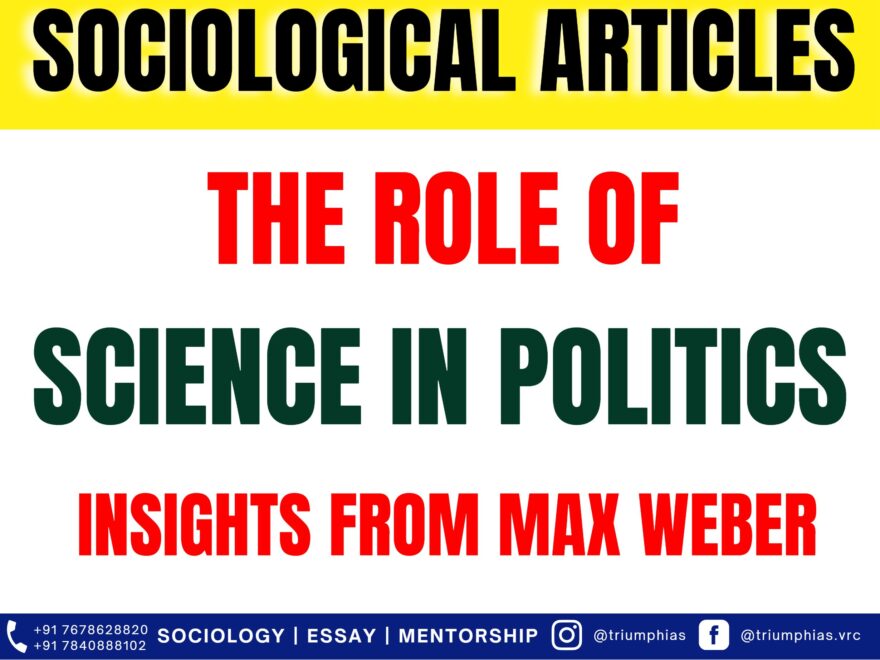Objectivity and Value Freedom
(Relevant for Sociology Optional Paper 1 (Unit 2))
The notion that science should be impartial and free from values is a highly debated topic. Weber was deeply concerned about fostering civic responsibility in modern society, as technical and scientific expertise was becoming increasingly significant.

Weber expressed apprehension about the blurring of boundaries between the roles of scientist and citizen, as well as the misuse of scientific prestige to support the claims of demagogues. He feared that individuals occupying the position of scientists would sometimes act irresponsibly by leveraging their scientific eminence and expertise to advocate for political policies that lacked scientific basis or authority. Weber believed that professors in his time often exceeded their scholarly competence in the lecture hall by delivering passionate speeches on political matters disguised as scholarly discussions.
While academics and scientists have the right to express their political viewpoints like anyone else, they do not possess greater privileges in the political arena. Therefore, they should confine their political persuasion to the public sphere of politics, where the most renowned historians, physicists, or sociologists are just equal voices among citizens. Fulfilling scientific responsibilities responsibly entails adhering to the customary rules of scholarly investigation and evidence-based proof, and refraining from engaging in political polemics within the classroom.

Facts and values
The differentiation between the scientific and the political realms was crucial for Weber, as it reflected a longstanding philosophical distinction between facts and values. Weber shared the widely held view that values cannot be logically derived from facts. Scientists can only observe and describe what occurs and how things are, but they cannot dictate how things ought to be, how we should live our lives, or what actions we should take. The provision of research and evidence does not absolve us from the responsibility of making value-based choices.
This distinction formed the foundation of Weber’s understanding of human existence and sociological methodology. He recognized an inherent diversity of conflicting human values, with no possibility of a scientific or rational basis to determine the preferable choice among them. Science cannot justify one value over another. Instead, we must individually decide which “Gods or Demons,” as Weber expressed it, to align ourselves with, which deities to worship, which leaders to follow, and which causes to champion. This act of choosing is a tragic aspect of human existence, often leading to profound conflicts within and between individuals. Consequently, Weber is sometimes referred to as a decisionist, emphasizing that we must select our values and commitments from a range of irreconcilable options and live with the consequences of our choices.
Therefore, science can never replace politics, and scientists acting solely in their capacity as scientists cannot become political leaders. Science’s legitimate role in politics can only be advisory. Scientists comprehend causal relationships and how things operate, enabling them to provide informed recommendations on how to achieve desired outcomes. However, their expertise cannot determine whether we should desire a particular outcome or a different one. The question of our preferences, such as choosing between X or Y, is a political decision that falls within the purview of political leaders. Scientific knowledge can greatly assist politics, but it cannot supplant it. Believing that politics can be rendered purely scientific is an illusion, as politics involves a struggle between values rather than empirical facts.
Weber never intended to exclude social scientists from politics but rather aimed to distinguish between the two roles they might assume: that of a disciplined inquirer and that of an engaged citizen. Within the realm of scholarship, scientists can strive for objectivity by diligently adhering to the obligations of their scientific role, following established rules of evidence and proof. In politics, the danger lies in blurring the distinction between the scientific and political roles, which can lend false authority to someone simply because they possess scientific expertise. In the realm of political administration, individuals serving as scientific advisers to politicians may exceed their role by encroaching upon the decision-making authority of legitimate political leaders. This can occur when they attempt to reduce complex matters of value-based choices to mere technical decisions or obfuscate political issues under the guise of scientific language. Weber recognized that science itself rests upon values. For instance, without valuing knowledge for its own sake, pursuing scholarly endeavors would be pointless. Weber’s concept of “value freedom” operates within the framework of accepted scientific values. He himself was not hesitant to engage in political activism or utilize scientific knowledge in shaping social policies. However, he expressed concern about the absence of decisive and visionary political leadership, leading some critics to perceive in his ideals a foreshadowing of the kind of leadership that Hitler would later offer the German people.
To master these intricacies and fare well in the Sociology Optional Syllabus, aspiring sociologists might benefit from guidance by the Best Sociology Optional Teacher and participation in the Best Sociology Optional Coaching. These avenues provide comprehensive assistance, ensuring a solid understanding of sociology’s diverse methodologies and techniques.
Max Weber, science, politics, scientist’s role, values, facts, scientific responsibility, value-based choices, political persuasion, decisionist theory, value freedom, scientific values, political leadership, civic responsibility” Best Sociology Optional Coaching, Sociology Optional Syllabus

